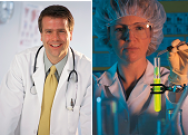
April 3, 2013 (San Diego's East County) -- Our Health and Science Highlights brings you cutting edge news each week that could impact your health and our future.
- As Arctic Ice Melts, It's A Free-For-All For Oil ... And Tusks (NPR)
- Weather: Key ingredient to never-ending fire season (FEMA)
- World’s first successful uterus transplant patient is pregnant via in-vitro fertilization (Raw Story)
- Heart drug linked to cancer (Ivanhoe Newswire)
- A Mile-High Hack: An App That Could Remotely Hijack Planes (NPR)
- Businesses Seek Out 'Culture Of Health' Areas (NPR)
- High levels of lead found in US rice (BBC)
- How 'green' are electric cars? (BBC)
- Supreme Court Asks: Can Human Genes Be Patented? (NPR)
- Rural electric co-ops go green (Christian Science Monitor)
Click read more and scroll down for excerpts and links to full stories.
HEALTH AND SCIENCE
As Arctic Ice Melts, It's A Free-For-All For Oil ... And Tusks (NPR)
The melting of ice in the northern latitudes is feeding new industries. Among them: speculating for petroleum products where vast amounts of undiscovered oil and natural gas are believed to be, and hunting for mammoth tusks unearthed in the softening tundra.
Weather: Key ingredient to never-ending fire season (FEMA)
With just a flicker of a match, a cigarette butt, or a lightning strike in the high country, fire takes its toll fast and with no regard for those in its path. These statistics, from last year alone, show how wildfires have a significant impact across the country:
World’s first successful uterus transplant patient is pregnant via in-vitro fertilization
(Raw Story)
The first woman ever to receive a uterus from a deceased donor, is two-weeks pregnant following a successful embryo transplant, her doctors said on Friday.
Heart drug linked to cancer (Ivanhoe Newswire)
For people living with heart arrhythmias, medications to control the unstable heart beat become a part of everyday life. However, one common arrhythmia drug may do patients more harm than good. A recent Taiwanese study discovered the medication amiodarone may increase the risk of cancer, especially in men and individuals with high amounts of the drug in their system.
A Mile-High Hack: An App That Could Remotely Hijack Planes (NPR)
By virtually hacking into flight management systems, a German IT consultant showed he can take remote control of planes in the air. The proof-of-concept software raises questions about efforts to secure global flight systems.
Businesses Seek Out 'Culture Of Health' Areas (NPR)
Businesses looking to relocate are making the health of a state's population part of their decision-making process. One Fortune 500 CEO explains it can save millions in reduced health insurance claims and absenteeism. Colorado's economic development officials are already trying to improve the health and fitness of the next generation of workers in order to stay competitive.
High levels of lead found in US rice (BBC)
Researchers reporting at the American Chemical Society meeting say they have found high levels of lead in samples of rice imported to the US.
How 'green' are electric cars? (BBC)
One of the authors of the report, at the Norwegian University of Science and Technology, Guillaume Majeau-Bettez, admits that he is shocked and disappointed that their findings are not more positive for EVs. "The electric car has great potential for improvement, but ultimately what will make it a success or failure from an environmental standpoint is how much we can clean up our electricity grid - both for the electricity you use when you drive your car, and for the electricity used for producing the car."
Supreme Court Asks: Can Human Genes Be Patented? (NPR)
Same-sex marriage got huge headlines at the Supreme Court last month, but in the world of science and medicine, the case being argued on Monday is far more important. The lawsuit deals with a truly 21st century issue that in some cases can pit drugmakers against patients
Rural electric co-ops go green (Christian Science Monitor)
Electric cooperatives have served rural Americans for generations. Some are taking advantage of their member-owned status to begin weaning their regions off of fossil fuels.










Recent comments